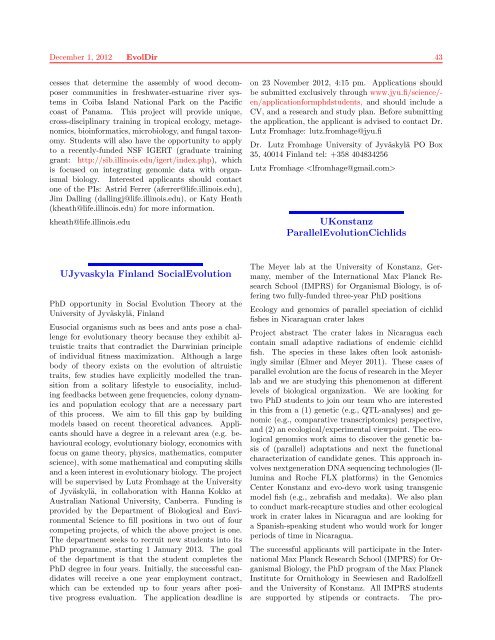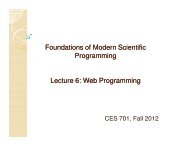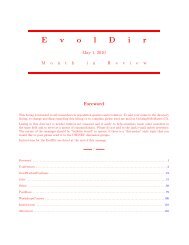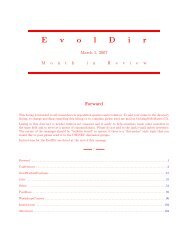E v o l D i r
E v o l D i r
E v o l D i r
Create successful ePaper yourself
Turn your PDF publications into a flip-book with our unique Google optimized e-Paper software.
December 1, 2012 EvolDir 43<br />
cesses that determine the assembly of wood decomposer<br />
communities in freshwater-estuarine river systems<br />
in Coiba Island National Park on the Pacific<br />
coast of Panama. This project will provide unique,<br />
cross-disciplinary training in tropical ecology, metagenomics,<br />
bioinformatics, microbiology, and fungal taxonomy.<br />
Students will also have the opportunity to apply<br />
to a recently-funded NSF IGERT (graduate training<br />
grant: http://sib.illinois.edu/igert/index.php), which<br />
is focused on integrating genomic data with organismal<br />
biology. Interested applicants should contact<br />
one of the PIs: Astrid Ferrer (aferrer@life.illinois.edu),<br />
Jim Dalling (dallingj@life.illinois.edu), or Katy Heath<br />
(kheath@life.illinois.edu) for more information.<br />
kheath@life.illinois.edu<br />
UJyvaskyla Finland SocialEvolution<br />
PhD opportunity in Social Evolution Theory at the<br />
University of Jyväskylä, Finland<br />
Eusocial organisms such as bees and ants pose a challenge<br />
for evolutionary theory because they exhibit altruistic<br />
traits that contradict the Darwinian principle<br />
of individual fitness maximization. Although a large<br />
body of theory exists on the evolution of altruistic<br />
traits, few studies have explicitly modelled the transition<br />
from a solitary lifestyle to eusociality, including<br />
feedbacks between gene frequencies, colony dynamics<br />
and population ecology that are a necessary part<br />
of this process. We aim to fill this gap by building<br />
models based on recent theoretical advances. Applicants<br />
should have a degree in a relevant area (e.g. behavioural<br />
ecology, evolutionary biology, economics with<br />
focus on game theory, physics, mathematics, computer<br />
science), with some mathematical and computing skills<br />
and a keen interest in evolutionary biology. The project<br />
will be supervised by Lutz Fromhage at the University<br />
of Jyväskylä, in collaboration with Hanna Kokko at<br />
Australian National University, Canberra. Funding is<br />
provided by the Department of Biological and Environmental<br />
Science to fill positions in two out of four<br />
competing projects, of which the above project is one.<br />
The department seeks to recruit new students into its<br />
PhD programme, starting 1 January 2013. The goal<br />
of the department is that the student completes the<br />
PhD degree in four years. Initially, the successful candidates<br />
will receive a one year employment contract,<br />
which can be extended up to four years after positive<br />
progress evaluation. The application deadline is<br />
on 23 November 2012, 4:15 pm. Applications should<br />
be submitted exclusively through www.jyu.fi/science/en/applicationformphdstudents,<br />
and should include a<br />
CV, and a research and study plan. Before submitting<br />
the application, the applicant is advised to contact Dr.<br />
Lutz Fromhage: lutz.fromhage@jyu.fi<br />
Dr. Lutz Fromhage University of Jyväskylä PO Box<br />
35, 40014 Finland tel: +358 404834256<br />
Lutz Fromhage <br />
UKonstanz<br />
ParallelEvolutionCichlids<br />
The Meyer lab at the University of Konstanz, Germany,<br />
member of the International Max Planck Research<br />
School (IMPRS) for Organismal Biology, is offering<br />
two fully-funded three-year PhD positions<br />
Ecology and genomics of parallel speciation of cichlid<br />
fishes in Nicaraguan crater lakes<br />
Project abstract The crater lakes in Nicaragua each<br />
contain small adaptive radiations of endemic cichlid<br />
fish. The species in these lakes often look astonishingly<br />
similar (Elmer and Meyer 2011). These cases of<br />
parallel evolution are the focus of research in the Meyer<br />
lab and we are studying this phenomenon at different<br />
levels of biological organization. We are looking for<br />
two PhD students to join our team who are interested<br />
in this from a (1) genetic (e.g., QTL-analyses) and genomic<br />
(e.g., comparative transcriptomics) perspective,<br />
and (2) an ecological/experimental viewpoint. The ecological<br />
genomics work aims to discover the genetic basis<br />
of (parallel) adaptations and next the functional<br />
characterization of candidate genes. This approach involves<br />
nextgeneration DNA sequencing technologies (Illumina<br />
and Roche FLX platforms) in the Genomics<br />
Center Konstanz and evo-devo work using transgenic<br />
model fish (e.g., zebrafish and medaka). We also plan<br />
to conduct mark-recapture studies and other ecological<br />
work in crater lakes in Nicaragua and are looking for<br />
a Spanish-speaking student who would work for longer<br />
periods of time in Nicaragua.<br />
The successful applicants will participate in the International<br />
Max Planck Research School (IMPRS) for Organismal<br />
Biology, the PhD program of the Max Planck<br />
Institute for Ornithology in Seewiesen and Radolfzell<br />
and the University of Konstanz. All IMPRS students<br />
are supported by stipends or contracts. The pro-

















